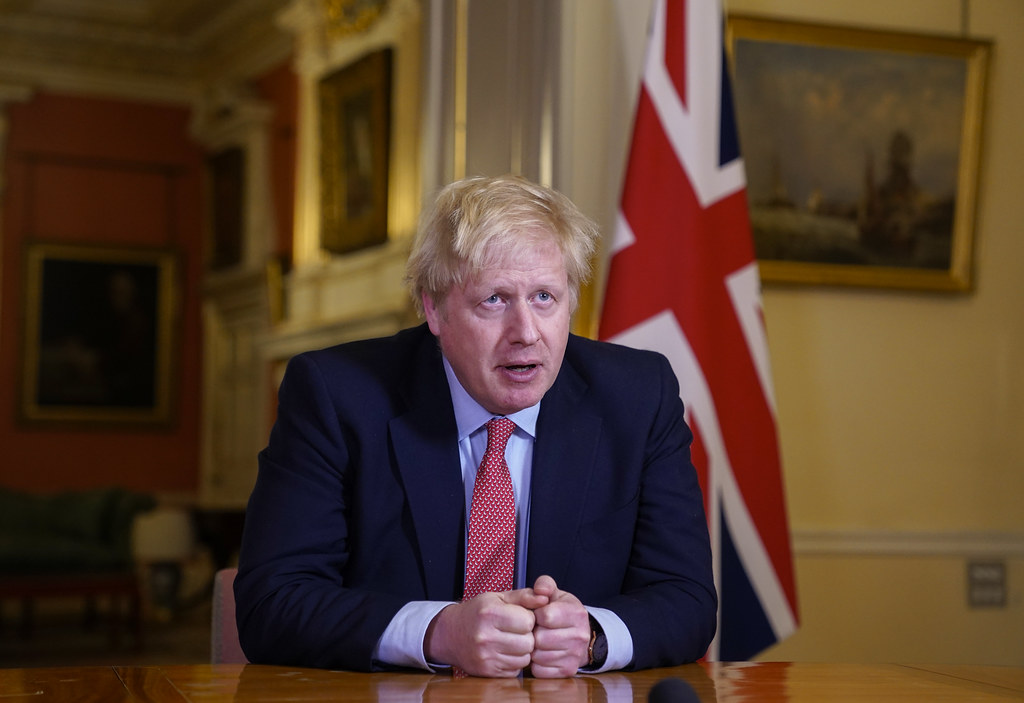
Creative Commons Licence
Boris Johnson has finally gone, but an entire country is paying the price
As Johnson's premiership ends he should be remembered for the lies and bullishness that put us all at risk.
Kimi Chaddah
07 Sep 2022
Boris Johnson has finally gone. The moving vans arrived last month, and in true pseudo-democratic fashion, 81,326 Conservative members decided Liz Truss should replace him as prime minister. His ‘victory tour’ could well be a parody, except it’s not – it’s reality, a farcical way to commemorate the damage he’s left behind.
Johnson’s tenure embodied how for the elite, it’s acceptable to lie and get away with it. From sacked journalist to corrupt politician, his career has been led by deceit and the endless pursuit of power. Yet all of these facets of his character were well-known long before Johnson became prime minister.
For Johnson, becoming prime minister was merely a continuation of the same path. He was forced to quit over a string of scandals, each in turn worsened by the disregard with which it was handled. He revelled in parties when the rest of the country was in lockdown; he allowed Chris Pincher’s behaviour and the alleged sexual harassment allegations against him to go unchecked. It’s a sign of this broken country that it took an unlawful prorogation of Parliament in 2019, cronyism contracts, his over £100,000 Downing Street refurbishment, Partygate, and endless Tory sleaze claims, for him to go.
Johnson is a liar by nature: he lied about lockdown parties; he lied to the Queen about suspending parliament; and the £350m emblazoned on the side of a bright red bus during the Brexit campaign – a figure plucked out from thin air that promised the NHS would receive that money instead of the EU – was once again an overwhelming lie. The lies and bullishness define his time as the purveyor of Brexit, as foreign secretary, the Mayor of London, and his position in the shadow Cabinet. The largely successful image of a happy go-lucky joker has now given way to a pervasive sense of entitlement, exemplified in fleeting outbursts in Parliament, or laughter in the most crass situations.
“Johnson’s tenure embodied how for the elite, it’s acceptable to lie and get away with it”
When Covid-19 hit Britain, Johnson had been in office for six months. His handling of the pandemic can be surmised as one of the UK’s worst public health failures. The Covid death toll would have been halved had a lockdown been introduced earlier, according to a former government advisor, while a peer-reviewed study concluded that 34,385 total deaths could have been avoided in England had measures been implemented one week earlier. For weeks, he seemingly ignored the severity of the crisis, boasting about “shaking hands continuously” in a hospital with Covid patients back in February 2020. And anybody paying attention knew that cronyism was rampant within the party, particularly when it came to PPE, but chose to keep him in power anyway.
Johnson’s obsession with self-preservation infiltrated all aspects of the political sphere, passing increasingly authoritarian pieces of legislation with long-lasting implications: the Police, Crime, Sentencing and Courts Bill, Human Rights Act, and widespread endorsement of cronyism, whether through the BBC, PPE contracts or Ofcom itself are only examples of what we know. There’s a reason 80% of the public think there is “a lot” or “a fair amount” of corruption in British politics, and only 1% think there is none.
The former columnist ultimately acted with impunity throughout his reign: he had a tendency to amend the rules in his favour, and carelessly pass legislation. Current draft proposals crafted under Johnson seek to strip the Electoral Commission (EC) of the power to bring its own criminal prosecutions for breaches of election law.
“Johnson has isolated and diminished the lived experience of minority communities to preserve his own image”
His behaviour has had an insidious impact on society. He created an actively dangerous environment for minority groups, passing bills such as the Nationality and Borders Bill, which renders two in five people from ethnic minorities eligible to be deprived of their citizen status. Johnson has a history of making offensive and disparaging comments that have no doubt had widespread ramifications. Back in 1998, while working as a journalist, he called gay men “tank topped bumboys”. In a 2018 column for the Daily Telegraph, he referred to Muslim women as “letterboxes”, having previously referred to Black people as “picaninnies” with “watermelon smiles”. After writing that a “bunch of Black kids” made him “turn a hair” in a column for the Evening Standard in 2000, Johnson added: “If that is racial prejudice, then I am guilty.”
His casual utterance of racist comments has contributed to the normalisation – and denial – of racism within the UK, no doubt evinced in the Sewell report, which declared institutional racism no longer existed. In doing so, Johnson has isolated and diminished the lived experience of minority communities to preserve his own image.
Johnson is only leaving because he became an electoral liability, despite being propped up by the same MPs who claim now that his leadership lacked integrity and competence. A poll conducted in June this year indicated that it would be a larger gamble for the Tories to keep Johnson in power than to replace him. In the end, he was ejected by reams of his own MPs who cited how his leadership was in direct opposition to the values of integrity, the presence of wide disagreements on government policy, and creating an “atmosphere of hostility” for LGTBQI+ people.
By elevating the likes of Priti Patel, Suella Braverman and Liz Truss, Johnson has ensured the country lurches further to the right in his absence. Boris Johnson’s spectre will continue to haunt British politics. Former Tory rival Rory Stewart has already warned of Johnson’s desire to do a “Berlusconi” rise back to power, while some Conservative supporters want Johnson back.
According to Johnson, “Britain will be stronger and more prosperous” after the cost of living crisis. That too can be added to his growing list of lies. Johnson may well leave, but an entire country is paying the price.
Like what you’re reading? Our groundbreaking journalism relies on the crucial support of a community of gal-dem members. We would not be able to continue to hold truth to power in this industry without them, and you can support us from £5 per month – less than a weekly coffee.
Our members get exclusive access to events, discounts from independent brands, newsletters from our editors, quarterly gifts, print magazines, and so much more!









